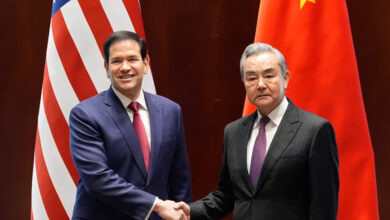
China’s internet restrictions have struck a “new blow” against foreign companies working there, Germany’s ambassador said on Monday, warning that such moves could undermine Beijing’s political and commercial ties with the world.
China’s ongoing clampdown on cyberspace has seen WhatsApp, the messaging service run by Facebook, periodically unavailable in the past few weeks ahead of twice-a-decade Communist Party Congress that opens on Wednesday.
The government also has been tightening control over virtual private networks (VPNs) that allow users to tunnel through China’s “Great Firewall” system, which blocks outlawed online content.
And its controversial Cybersecurity Law adopted late last year has been criticized by foreign business and governments for unclear provisions mandating security reviews and for data to be stored on servers in China.
“Unrestricted internet access via VPN is vital if China wants to take maximum advantage of international cooperation in research and development as well as academic and cultural exchange,” German Ambassador Michael Clauss said in a statement.
The higher the digital wall grows, the less attractive living and working in China will be for professionals, researchers or artists, Clauss said, adding that repeated requests to discuss the issue with Chinese authorities “have not led to meaningful dialogue so far”.
“In the ‘offline’ world, our overlapping economic and political interests bring us closer together, but this trend may not be sustainable if excessive cyber controls drive us apart,” Clauss said.
The Cyberspace Administration of China, which regulates the internet, did not immediately respond to a request for comment.
Chinese officials say the country has a sovereign right to govern the internet as it sees fit, and that its expansive national security and cybersecurity regulations are needed to address threats such as hacking and terrorism.
China’s cyber law also mandates companies store crucial data within China and pass security reviews. Critics say such measures could unfairly target foreign firms or put business secrets at risk.
After pushback from overseas business groups, China agreed to an 18-month phase-in period from June, but fundamental concerns about the law remain.
Clauss’s comments come at a sensitive time for China, as President Xi Jinping looks to consolidate his power for a second five-year term as the nation’s leader during the upcoming congress.
Beijing has tightened controls on Chinese society since Xi assumed power, from online censorship to a crackdown on activists and non-governmental organizations.




